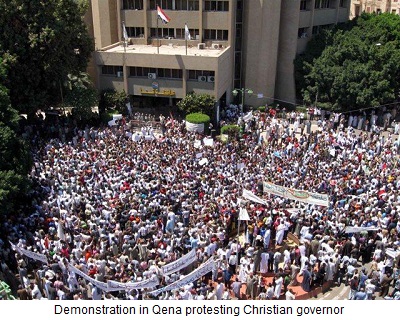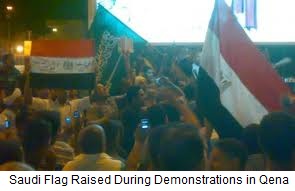

 (AINA) -- Between the April 14 appointment of the Christian Major General Emad Mikhail as governor of the southern province of Qena and the Prime Minister's decision on April 25 to suspend his appointment for a three months period, "Egypt lived through the biggest and most dangerous political and sectarian crisis in its modern history. Although no blood was shed and no clashes between Muslims and Christians took place, the 'civil state' was put to a difficult test -- which it failed miserably," wrote journalist Mohamed Hamdy in an article for the daily newspaper Youm7.
(AINA) -- Between the April 14 appointment of the Christian Major General Emad Mikhail as governor of the southern province of Qena and the Prime Minister's decision on April 25 to suspend his appointment for a three months period, "Egypt lived through the biggest and most dangerous political and sectarian crisis in its modern history. Although no blood was shed and no clashes between Muslims and Christians took place, the 'civil state' was put to a difficult test -- which it failed miserably," wrote journalist Mohamed Hamdy in an article for the daily newspaper Youm7.
The Muslim Brotherhood and Salafi leaders managed to bring thousands of protesters from inside and outside Qena, who after Friday prayers on April 15 staged an 11-day sit-in in front of the governorate building, demanding the removal of the new governor. Muslim protesters vowed to bar Major General Mikhail, who replaced the former Christian governor Magdi Ayoub, not only from entering the governorate building to carry out his functions as Governor but from the whole province, with some vowing to kill him.
The Muslim protests against the new Christian governor escalated in time. At first, the Muslim Brotherhood announced the reason for refusing Gen. Mikhail was only because he was an ex-policeman who worked for the State Security and was involved in the killing of the demonstrators in Tahrir Square in Cairo during the January 25 Revolution. This was refuted by Major General elNomany, minister of local development. The Muslims said that Christians joined them in refusing the Christian governor. This was refuted by the church, stating that Christians did not participate in any protests.
The Salafis, who control the majority of mosques in Qena, recruited the Imams to preach and issue Fatwas (religious edicts) saying the rule of non-Muslims over Muslims in not admissible, as per 'Allah will not give access to the infidels (i.e. Christians) to have authority over believers (Muslims) [Koran 4:141].
The demonstrators openly demanded a "Muslim governor in a Muslim country," walking the streets chanting "Mikhail is an infidel pig,", "There is no god but Allah and Christians are the enemies of Allah" and "Muslim, Muslim, will govern us" (video of Muslims chanting "we will never be ruled by a Christian governor").
Protesters declared their rejection of any negotiation with the ruling military governor and commander of the southern region before the dismissal of governor Mikhail. The minister of interior and the minister of local development also failed in their mission to end the protests and open the railway routes, and went back to Cairo with the same message: "no negotiations before the dismissal of the Christian governor."
 The protesters called for the establishment of an Islamic state under the slogan "No god but Allah -- Islamic - God willing," provoking a state of fear among many Christians. They waved the Saudi Arabian flag. The protesters then blocked the railroad track and highways between Cairo and Aswan for 8 consecutive days, completely paralyzing railway stations in Aswan, Luxor and Qena and causing the suspension of rail services for 8 days (video).
The protesters called for the establishment of an Islamic state under the slogan "No god but Allah -- Islamic - God willing," provoking a state of fear among many Christians. They waved the Saudi Arabian flag. The protesters then blocked the railroad track and highways between Cairo and Aswan for 8 consecutive days, completely paralyzing railway stations in Aswan, Luxor and Qena and causing the suspension of rail services for 8 days (video).
The armed forces did not intervene to stop the demonstrators from blocking the highway.
On April 21 27 renowned Egyptian human rights organizations sent a letter to Field Marshal Tantawi, head of the ruling Supreme Council of the Armed Forces, and to the Prime Minsiter Dr. Essam Sharaf, expressing their deep concern over the events in Qena. The letter said "There were reports of raising the Saudi Arabian flag and the declaration of Qena as an 'Islamic Emirate,' and in this context, all roads leading to the province were cut off, including the railways." It went on to say that the Salafis removed students out of schools and shut them down, closed the Dandara Bridge which connects the west and east of the Nile, offloaded female passengers from busses to separate them from the male passengers in public transport, attempted to cut off the water supply from the province of the Red Sea, and prevented Christians from celebrating Palm Sunday.
The letter blamed the attitude of the military council and the government for the escalation of the objections posed by the Islamists groups to the appointment of governor Mikhail from being an ex-policemen to being a Christian. According to the letter, "They were encouraged because of the lenient attitude of the State represented by the military council and the government to past violations, such as the demolition of the church in Soul (AINA 3-5-2011) and the cutting off of the ear of citizen Ayman Anwar Mitry in Qena (AINA 3-26-2011), with the State only sponsoring reconciliation sessions between the two parties which are humiliating to the Christians and a way of trying to go around non-application of the law. "They even used at these meetings Salafi clergy who have always incited against the native Christians, which has encouraged these groups to ignite the fire of sectarian strife."
Egyptian Coptic female activist Hala el Masry, who lives in Qena, said the Salafis were the main players and when the Muslim Brotherhood saw matters got out of control, they pulled out of the protests. She stressed that the Salafis were collecting signatures for the appointment of one of the Salafi clerics as Amir (leader) of the faithful and governor of Qena. On April 28 the Salafis raised the Saudi Arabian flag for the second time, and staged a sit-in in front of the mosque of Sheikh Abdelrehim el-Qenawi, demanding the appointment of Sheikh el Qurashi as Amir of the faithful and governor of Qena, reported Coptic activist Mariam Ragi.
The position of the army was incomprehensible to many Egyptians and dozens of articles appeared criticizing the inaction of the military towards the radical Muslims in Qena in blocking off the railway connecting Qena with Cairo, as well as several other main highways. The articles called on the military to force the Salafis to respect the authority of the State.
When all efforts failed to dissuade the Muslims in Qena to end their protest and accept the new Christian governor, the government suspended the governor's appointment for three months, giving sectarianism the final word.

or register to post a comment.